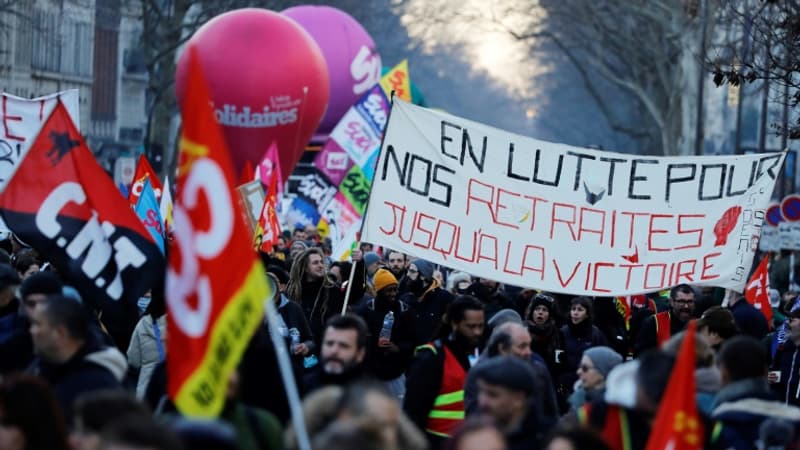A week after the announcement of the unions of a first mobilization against the pension reform on Thursday, January 19, the face of tomorrow’s day and its various consequences are clearer. Yesterday at the end of the day, the RATP and the SNCF communicated in particular their traffic forecasts, especially expected since transport is a sector traditionally with a high rate of mobilization. While the general secretary of the CGT, Philippe Martínez, points to a million people in the streets, the intelligence services anticipate between 550,000 and 750,000 demonstrators. The government is already calling on the French who can postpone their trips or telework.
Education
The movement promises to be very popular in schools, with 70% of teachers striking nationwide in first grade and “at least a third” of schools closed in Paris, according to Snuipp-FSU, the first primary union. The mobilization would thus be of the same magnitude as in December 2019: during the first day of the strike against the previous reform attempt, the unions had accounted for 70% of the strikers, while the ministry had identified 55%.
In colleges and secondary schools, “we are also going on a very frequent strike”, according to the first elements collected by the Snes-FSU, the first secondary union.
Railway transport
Traffic will be “very disturbed” on the Paris metro, with three lines closed, another ten open “only at peak hours” and “risk of saturation” in the last three, according to the RATP. On RER A and B, the two busiest lines in Europe, traffic will be limited to one train in two at most during peak hours, while interruptions will be more limited on buses (2 out of 3) and trams (3 out of 4). ).
At SNCF, train traffic will be “very disrupted”, especially on regional trains – TER and Transilien. The railway company projects 1 of 3 TGVs in the North axis, 1 of 4 in the East, 1 of 5 in the Atlantic, 1 of 3 in the Southeast and 1 of 3 in Ouigo. But also 1 TER train in 10 on average, and in Ile-de-France 1 train in 3 on lines A, B, H and U, and 1 train in 10 on lines C and D (partially closed) , J , K, L, N and P.
Aeronautic sector
The strike will also be followed by air traffic controllers, in particular at Orly airport, where the General Directorate of Civil Aviation (DGAC) has asked companies to preemptively cancel 20% of their flights, warning that this will not prevent “disruptions and delays”. . Flights to overseas territories, many departing from Orly, are not affected by cancellations, in the name of territorial continuity. According to Orly’s manager, Groupe ADP, last month the airport platform hosted an average of 530 flights per day of departure or arrival. Therefore, just over 100 flights would be canceled on Thursday.
Air France plans to operate on Thursday “all its long-haul flights” and “almost 90% of its short and medium-haul flights,” it specified Tuesday night, although “last-minute delays and cancellations cannot be ruled out. “. By Thursday, “the DGAC will apply the provisions of the minimum service in the en-route air navigation centers (CRNA) and in the air navigation services of the airports where the regulatory provisions allow it,” the administration specified.
Air France customers affected by flight cancellations will be “individually notified by SMS, email or via the app” of the company. “Commercial measures (…) allow anticipation or postponement without charge and, for customers whose flight is cancelled, a credit note or a full refund in case they no longer travel.”
Energy
With the support of all the unions in the sector, the strike will result in cuts in the production of power plants that should not lead to power cuts. “It is something that is perfectly framed,” says Pascal Jacquelin, number two at CFE-Energie.
On the other hand, the threat issued by the CGT, of “selective cuts” aimed in particular at elected officials who support the reform, is not unanimous because “this can represent risks,” he adds. The same for the rest of the movement that “is not the subject of a consensus to date”, the CGT promoting the renewal on Friday while the unions plan to meet again on Monday.
In refineries and fuel depots, the CGT has already stopped its hours: after Thursday’s, it foresees other 48-hour work stoppages on January 26 and 27, after 72 hours from February 6 to 8. The impact will not be immediate on service stations because “stocks can largely absorb” a first 24-hour strike, but “some highway stations could close,” says Eric Sellini, CGT manager at TotalEnergies.
and in another place
In public finance, while it is difficult to predict cash closures in advance, pension reform “is on everyone’s mind,” according to Anne Guyot-Welke, general secretary of Solidaires Finances publiques.
Source: BFM TV


